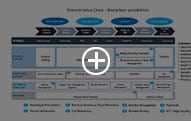Industry Stories
Blockchain in Telecom and Media – A Game Changer
Blockchain as a technology has the potential to disrupt or change business models in almost every industry. According to a recent report by a leading market research company, blockchain in telecom market is expected to grow from USD 46.6 million in 2018 to USD 993.8 million by 2023, at a Compound Annual Growth Rate (CAGR) of 84.4% during the forecast period.
What’s the Buzz About?
Blockchain is a shared ledger, replicated across stakeholders in the network, that maintains complete history of all transactions between two or more parties. A history that’s verified by other stakeholders and cannot be tampered with. Transaction records are immutable and private or public network can be restricted. In other words, its value proposition lies in the security, transparency, and control it provides across the ecosystem at every point of a transaction and the opportunity to reduce intermediaries.
While fintech was one of the earliest industries to first adopt the technology (check out the Blockchain based Trade finance Solution) there are varied possibilities in almost every industry and particularly in the telecom, media and IoT industries.
Blockchain Brings Value to the Telco Value Chain
The telecommunications value chain consists of providing the necessary network infrastructure and connectivity for voice, data, media and other related services. There is data exchange between networks that call for data security, data integrity, data inspection, and fraud prevention. With IoT and edge computing, more devices gets added to the network and there is a need for device identity and security. New flavors to network management and new infra sharing models are coming up, e.g., lease management of 5G Network slices for telco and network partners, enterprises, Mobile Virtual Network Operators (MVNOs), and Over the Top (OTT) players.
Core operations like Operation Support System (OSS) and Business Support System (BSS) processes include partner management, enterprise management and customer management to address contracts, settlement, supply chain management, SLA management etc. Also, in the digital journey, new business models and eco system partners come into play. Blockchain can help simplify the process, make them secure, transparent and efficient and find new revenue streams through digital bundle value propositions.
Let’s talk about few telco specific scenarios:
Simplifying processes
In roaming partner settlements, current processes take a month and issue resolution timelines go up to two months. With blockchain, the process gets simplified with real time views. This helps in faster issue identification, resolutions, and reduced disputes.
Companies can automate SLA agreement documents into Smart Contracts through programmable blockchain solutions and provide real time view to all the stakeholders with threshold breaches made visible immediately to the involved parties.
Revenue Streams beyond Telecom
Digital Identity/sharing any Identity reference documents e.g., passport or driving license with relevant parties based on the individual’s consent is key to simplifying the process of KYC (Know Your Customer) document verification in any industry or enterprise. Blockchain allows de-centralized storage of these reference documents with control remaining completely with the individual.
Other opportunities are digital sharing of music, mobile games and payments through mobile wallet with blockchain; scenarios cover royalty management and digital asset management.
Improved Collaboration
Multiple business transactions are efficiently carried out in a consortium model, where-in stakeholders have common interest and come together to be part of the blockchain network, e.g., Trade Finance, KYC, etc. Blockchain can play a key role in bringing all the stakeholders together.
In the Telco world, CSPs connect with their partners, other telecom companies, and suppliers in order to provide connectivity, services for their customers and to adhere to SLAs, so that they can provide a seamless customer experience. Such complex transactions and interactions between all these parties make it imperative to ensure there is trust, security and transparency. For telco ecosystems in the B2B and sometimes B2B2X models, we look at permissioned network that brings in multiple benefits. In a permissioned blockchain network, a group of participants are identified and given express authority to provide validation of blocks of transactions.
Choosing the Right Blockchain Technology
Bitcoin was the first blockchain technology and today there are varied technologies, just to mention a few – Hyperledger, Ethereum, Ripple, Multichain, Sawtooth, Corda, and specific domain solutions. While there are multiple choices, blockchain technologies are in different maturity stages and are constantly evolving, it is important to select the right technology in context of the use case in hand. For example, for computational logic, preference can be a blockchain platform that supports Smart Contracts like Hyperledger; for registries, Multichain is an option.
Key parameters for choosing a blockchain solution include:
1. Use Case 2. Value delivered through blockchain solution for the identified use case 3. Data that needs to be stored and processed 4. Programming Languages supported 5. Open Eco System 6. Public Key Infrastructure (PKI) 7. Transaction size, rate 8. Consensus Model 9. Platform Community 10. Smart Contracts, programmability 11. Computational needs 12. Infrastructure, deployment models.
Digital telco looks for extreme digitization across organization and ecosystems and blockchain can be a viable solution for specific scenarios and bring in simplified process, efficiency, and transparency.





